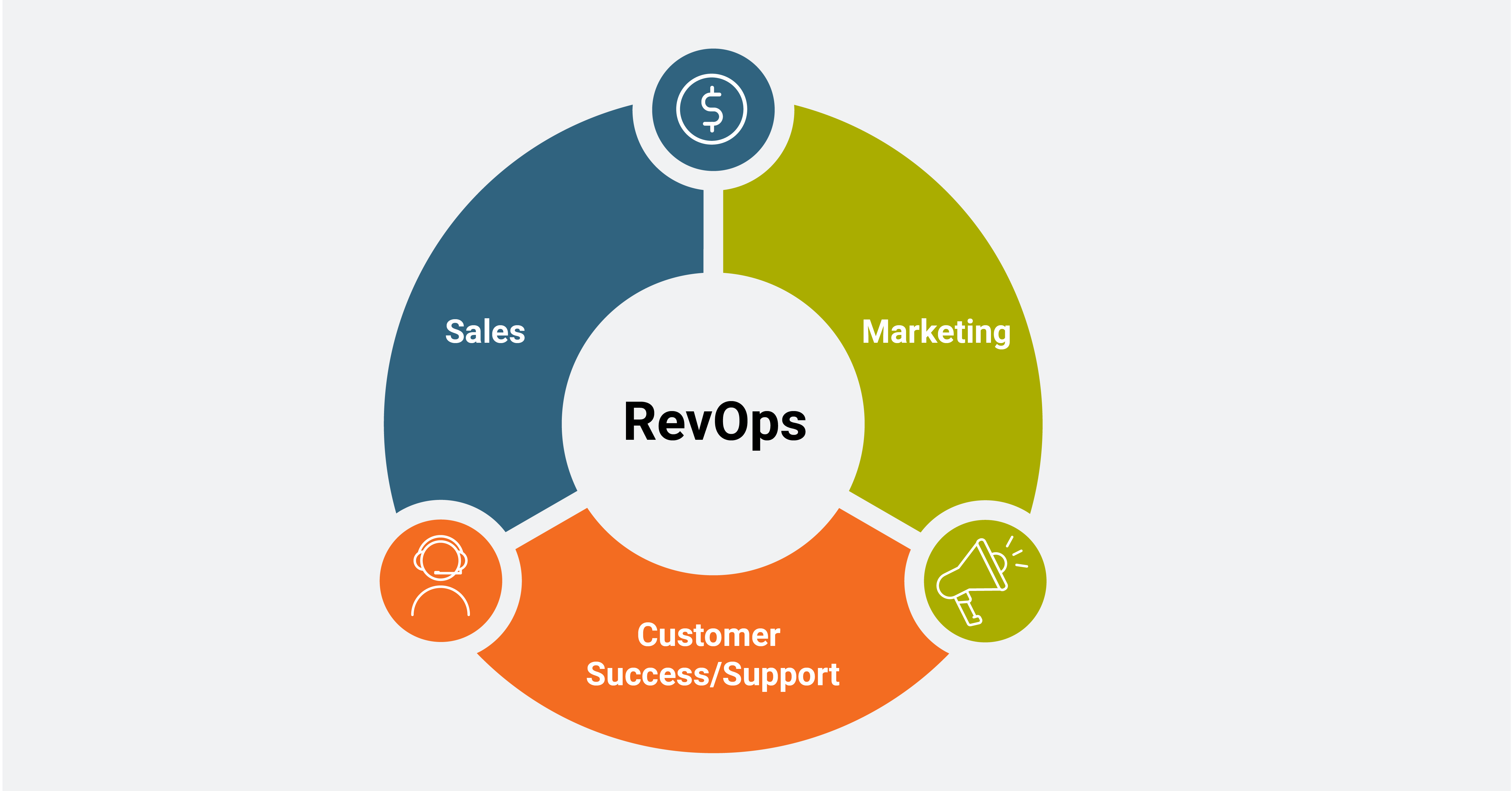 Revenue and sales form the lifeblood of any company. Increased sales equals more revenue and, therefore, growth. And when it comes to driving growth, two approaches quickly come to mind: Sales Operations (Sales Ops) and Revenue Operations (RevOps).
Revenue and sales form the lifeblood of any company. Increased sales equals more revenue and, therefore, growth. And when it comes to driving growth, two approaches quickly come to mind: Sales Operations (Sales Ops) and Revenue Operations (RevOps).
These functions allow businesses to drive efficiencies in the sales and revenue-generating processes. But if that’s the case, you might wonder, “What’s the difference between RevOps and Sales Ops” and “Which one is best for my business?”
While Sales Ops and RevOps are laser-focused on the same objective, the way it's done under each model is quite different. Depending on your business situation, one may be more important than the other. So, we created this article to demystify the difference between RevOps and Sales Ops.
We’ll explain what these functions are and how they differ from one another so you can decide which one is best for your business right now.
Sales Operations (Sales Ops)
Sales Ops is a familiar term to many. It’s the function responsible for ensuring the sales team’s success by improving sales processes, implementing best practices, and more. Overall, it’s the backbone of a successful sales team — and, ultimately, a thriving organization.
The objective is simple: help sales representatives focus on selling. Depending on the size of the organization, the Sales Ops leader or team is responsible for the following:
- Setting the high-level strategy for the sales team
- Forecasting sales performance and growth
- Planning and segmenting territories
- Implementing and optimizing the sales stack
- Documenting, optimizing, and automating sales processes and operations
- Tracking and reporting on the sales team’s performance
- Recruiting and training sales reps on sales best practices
- Resolving sales conflicts
Sales Ops functions have a tremendous impact on an organization’s bottom line. This data-driven approach reduces friction within the sales process, boosting productivity and unlocking a significant uptick in sales. That’s why 89% of sales professionals say Sales Ops plays a critical role in growing the business, according to Salesforce.
Revenue Operations (RevOps)
Unlike Sales Ops, RevOps is often a broader function. It aligns revenue-generating roles — sales, marketing, and customer success/support — under one umbrella. The aim is to eliminate departmental silos and increase revenue by aligning goals and metrics across the go-to-market (GTM) team or function.

Whereas Sales Ops zeroes in on sales efficiency, RevOps ensures overall effectiveness. It's like the maestro, harmonizing all operational teams under one roof. RevOps extends beyond the sales department to include marketing and customer success, among others, focusing on:
- Providing cross-department visibility
- Collecting and analyzing data for forecasting and planning purposes
- Boosting coordination among different teams
RevOps streamlines operations across customer-facing roles via process unification, tech integration, and data-driven decision-making. Its goal is to align these teams around a unified view of revenue generation, eliminating potential barriers or silos that could hinder this process.
RevOps maximizes the impact all teams have on revenue — not just the sales team. Indeed, Forrester's research shows that RevOps boosts revenue growth by 36% and profitability by 28%.
RevOps vs. Sales Ops: The Key Differences
RevOps and Sales Ops differ in terms of their scope, roles, and objectives. Here’s a closer look at the key differences.
Scope
Sales Ops focuses specifically on a company’s sales functions. It’s just one ingredient of the revenue pie. RevOps encompasses the entire revenue pie. Think of it as the business framework that closely ties sales, marketing, and customer success back to the business’s overarching objective and goals.
Roles
The role of Sales Ops is to make sales more effective. It removes roadblocks from sales processes and equips sales teams with the necessary resources and data to maximize its impact. RevOps is responsible for streamlining operations across all customer-facing roles and ensuring better coordination among different teams. The goal is to make the business more effective.
Objectives
Both functions aim to increase revenue. However, Sales Ops focuses specifically on improving sales from existing revenue streams, whereas RevOps covers both that and finding new revenue streams. What’s more, Sales Ops is all about making sales more effective (internal focused), while RevOps centers on enhancing the customer experience (customer/outward focused).
Even the metrics both functions focus on are different. For example, Sales Ops tends to focus on the close rate, average sales cycle, and win/loss ratio. In contrast, RevOps focuses on annual reoccurring revenue (ARR), Renewals/Upsells, and revenue retention.
Final Thoughts: Sticking to Sales Ops or Shifting to RevOps
In today’s hyper-competitive business landscape, it’s vital to understand the distinct roles of Sales Ops and RevOps. While Sales Ops focuses on enhancing sales efficiency and driving revenue growth, RevOps takes a broader approach, uniting all revenue-generating functions to ensure a cohesive, company-wide strategy.
Despite their differences, both Sales Ops and RevOps aim to boost your company's revenue growth and operational efficiency. They serve as vital cogs in the business machine, each providing unique benefits and contributing to the overall success of your organization.
Remember, there's no one-size-fits-all approach. The choice between focusing on Sales Ops or transitioning to a RevOps model depends on your business size, needs, and growth objectives. By understanding the nuances of these two operational strategies, you can make informed decisions that best suit your organization's needs and pave the way for sustained success.





